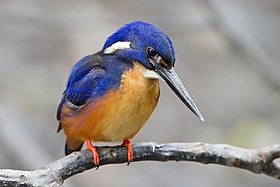

Alcedinidae is a family of birds commonly known as kingfishers, which are found worldwide in various habitats near water bodies. They are known for their distinctive appearance, with a large head, long sharp beak, and brightly colored feathers. Kingfishers are excellent hunters, and their diet primarily consists of fish, but they also feed on insects, crustaceans, and other small animals.

Kingfishers are admired for their beauty and behavior, and many species have cultural and spiritual significance in various cultures around the world. They are also important indicators of water quality and ecosystem health, as they are sensitive to changes in their habitat.

The Alcedinidae family includes over 100 species of kingfishers, and they are classified into three subfamilies: Alcedininae (river kingfishers), Halcyoninae (tree kingfishers), and Cerylinae (water kingfishers). Some of the well-known species of kingfishers include the Common Kingfisher, Belted Kingfisher, and the Kookaburra.

Overall, the Alcedinidae family of birds is a diverse and fascinating group of avian species that play an important role in the ecosystem and are admired for their beauty and behavior.

